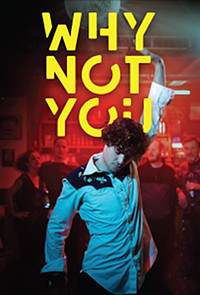| SHADOWS ON THE WALL | REVIEWS | NEWS | FESTIVAL | AWARDS | Q&A | ABOUT | TALKBACK | |||||||||||||
 Shadows off the beaten path Shadows off the beaten pathIndies, foreign, docs and shorts...
On this page:
MY TENDER MATADOR |
TWO LOTTERY TICKETS |
WHY NOT YOU
| |||||||||||||
| See also: SHADOWS FILM FESTIVAL | Last update 3.Jun.21 | |||||||||||||
|
My Tender Matador Tengo Miedo Torero Review by Rich Cline | 
| |||||||||||||
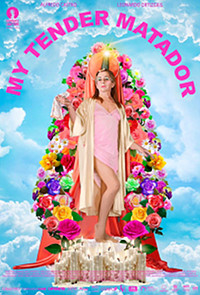 dir Rodrigo Sepulveda Urzua scr Rodrigo Sepulveda Urzua, Juan Elias Tovar prd Florencia Larrea, Lucas Engel, Gregorio Gonzalez, Jorge Lopez Vidales with Alfredo Castro, Leonardo Ortizgris, Julieta Zylberberg, Sergio Hernandez, Amparo Noguera, Ezequiel Diaz, Luis Gnecco, Paulina Urrutia, Gaston Salgado, Erto Pantoja, Nicolas Zarate, Victor Montero release Chl 15.Oct.20, US 4.Jun.21 20/Chile 1h33 VENICE FILM FEST Is it streaming? |
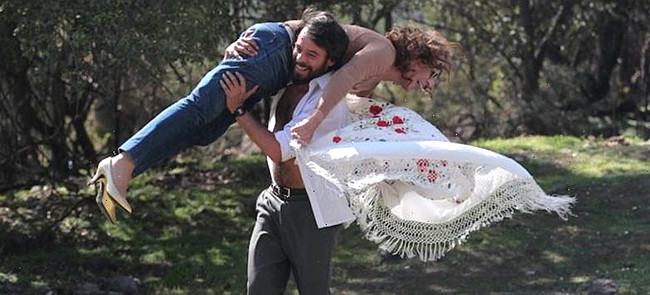 There's a realistic edge to this Chilean drama, which traces an unusual relationship between two men forced to live in the margins of society. Filmmaker Rodrigo Sepulveda Urzua finds clever ways to depict a specific time and place, while making a larger comment about national history and generational perspectives. And he strikes a careful balance between political thriller and sensitive love story, which makes the film memorable and moving. In 1986 Santiago during Pinochet's oppressive regime, crossdressing queen La Loca (Castro) is fleeing from the violent police raid of a drag club when he's rescued by handsome guerrilla Carlos (Ortizgris). As they become increasingly close as friends, La Loca allows Carlos to use his home as a base where his revolutionary student cohorts can develop their plot to assassinate the dictator. This of course makes La Loca nervous, but he's unable to resist Carlos, and vice versa. The question is whether there's a future for them even if the uprising succeeds. La Loca lives in an earthquake-damaged house, which quietly reflects the perilous, devastated nature of life for La Loca and his tight circle of friends. Carlos' entry into this world is fascinating, played in a way that's both warm and colourfully amusing. And their interaction reflects how being gay or trans is rejected both by the hardline right-wing military and the left-wing rebels. The title comes from a song (literal translation: I'm frightened bullfighter) that underscores the dance of attraction between these two men. With another engaging, invested performance, Castro digs deep into La Loca's internal life, a 60-something man who puts on a flamboyant front to cover how precarious his life is. Wilfully ignoring the harsh realities around him, because all sides hate him, he dives into this unexpected connection with the young, repressed Carlos, played with offhanded charm by Ortzgris. The contrast between the politically engaged Carlos and the not-so-naively disconnected La Loca is beautifully explored in moments of joy as well as darkness. There are several layers of community depicted in this story, each of which plays into the relationship between La Loca and Carlos, as well as vivid people who have their own lives around them. Sepulveda and cinematographer Sergio Armstrong skilfully shift between locations that feature inky shadows, rich-hued costumes and dappled sunshine. And there are some ambitious storytelling choices along the way, including surreal moments that find emotion in pointed political situations.
| ||||||||||||
|
Two Lottery Tickets Două Lozuri Review by Rich Cline | 
| |||||||||||||
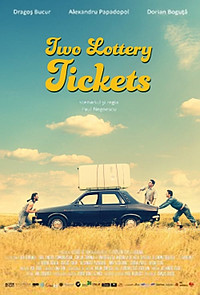 dir-scr Paul Negoescu prd Dragos Bucur with Dorian Boguta, Dragos Bucur, Alexandru Papadopol, Nora Cupcencu, Codin Maticiuc, Dragos Niamtu, Irina Noaptes, Ruxandra Serban, Ana Vicoveanu, Ioana Dimitriu, Codrina Patru, Andi Vasluianu release Rom 7.Oct.16, US 21.May.21 16/Romania 1h26 Is it streaming? |
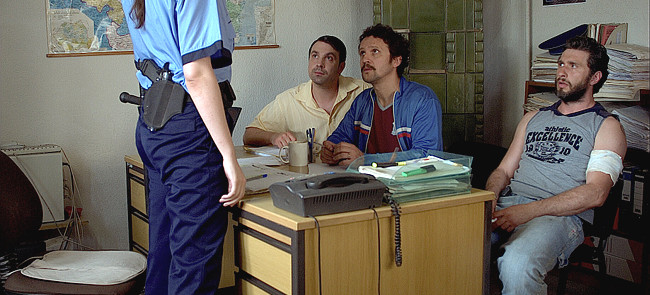 A wry buddy comedy from rural Romania, this amiable movie follows three hapless friends through a series of gently sparky situations. The premise is simple, and writer-director Paul Negoescu approaches it with a deadpan shooting style that keeps everything grounded. This may mean that the energy level is very low, but there's a goofy charm that holds the interest, and even some mild suspense in a few nutty set-pieces. In a small town, three friends are discussing random options that might help them escape their financial doldrums, when gambling addict Sile (Bucur) unsurprisingly suggests playing the lottery. Pompiliu (Papadopol) is dubious as always, but Dinel (Boguta) decides it's worth a shot, especially as he's under pressure from his estranged wife Gina (Cupcencu). When their numbers come up, winning €6 million, Dinel remembers that the ticket was in a bumbag stolen by two thugs (Maticiuc and Niamtu). Afraid to involve the police, they begin following a series of clues that lead them to Bucharest. Most scenes in this film revolve around a series of slights, as nice guy Dinel endures constant abuse from aggressively macho strangers. And as they try to track down the thieves, these three buddies are sidetracked by a series of low-key adventures. This includes going door-to-door in Dinel's building, where they encounter some hilariously stoned neighbours as well as mother and daughter clairvoyants (Serban and Vicoveanu). Since they're reluctant to admit exactly what they lost, conversations are amusingly aimless. Each of these three earnest but clueless men have distinct quirks that the actors are able to have fun with. Bucur has the most colourful role as the dopey Sile, who never has any money and clearly doesn't quite grasp the concept of it. The clean-cut government employee Papadopol is more observant, but equally oblivious. And Boguta's Dinel just silently accepts whatever happens without question. This includes never standing up for himself, which helps explain what has happened with his marriage to Cupcencu's feisty Gina. Much of the script's humour stems from the fact that these three guys have virtually no self-awareness. So as the plot drifts along, there are moments that raise a smile while other encounters feel somewhat uneven or uncharacteristic, never generating even a hint of narrative arc for these men or their friendship. There are also some issues with the meandering story structure, which has a tendency to drag even with the brief running time. Still, it's a deeply likeable movie, with knowing wit and a couple of terrific punchlines.
| ||||||||||||
|
Why Not You Hochwald Review by Rich Cline | 
Is it streaming?
| 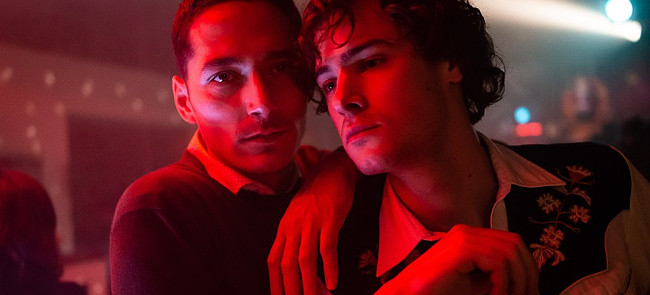 This Austrian drama cleverly captures the disparity between gritty reality and the internal ambition to live your most colourful, fabulous life. From the start, writer-director Evi Romen weaves complexity into the story and characters, even if many scenes feel unfinished and the narrative unfolds without much momentum. But this is a knowing, insightful look at the messy impact of trauma, and everyday issues make the film resonate vividly. In a small town, trained pastry chef Mario (Prenn) works as a butcher while rehearsing his flashy dance moves in private. His best friend Lenz (Saavedra) is moving to Rome to be an actor, so Mario decides to tag along. But Lenz is killed in a horrific terrorist attack, and Mario returns home in shock. He turns to drug use to dull the pain, then in the nearby city reconnects with school friend Nadim (Mohamed), a Muslim who offers a different kind of healing. But Mario can't escape the feeling that he shouldn't be here. Romen cleverly captures disparities between urban and rural life, separated here by a cable car. In the village above, shifting tensions abound, with over-involvement that feels perilous. Early on, we see Mario envying Lenz's open embrace of his sexuality after living in Vienna. And these neighbours are more then homophobic; they gossip and judge everyone without filters. Villagers are suspicious because Mario returned without a scratch, while he knows that isn't true. And Lenz's grieving but cruel mother (Lechthaler) is perhaps the worst of the lot. The bond between Mario and Lenz is sharply well developed, with layers of emotion rippling around their relationship. Prenn and Savedra are excellent, revealing thoughts and feelings, as well as a relaxed physicality that sharply echoes their romantic past. Petulant and impatient, Mario isn't always easy to like, but Prenn keeps him sympathetic, especially as Mario struggles to cope with his emotional reaction after Lenz's death. It's easy to understand why he wants to scream whenever someone tells him to calm down. Tellingly, the hushed racism of these villagers is just as violent as the homophobic terrorists. Mario is desperate to find someone who can see the person he is inside. The irony of finding this in a mosque is more than a little on-the-nose, and even if the imam (Ramadan) seems gently open-minded, Mario's sexuality is bound to become an issue there. The plot skirts around this mixture of issues without offering much insight, but it does give us plenty to chew on.
| 
See also: SHADOWS FILM FESTIVAL © 2021 by Rich Cline, Shadows
on the Wall
HOME | REVIEWS | NEWS | FESTIVAL | AWARDS
| Q&A | ABOUT | TALKBACK | | ||||||||||

